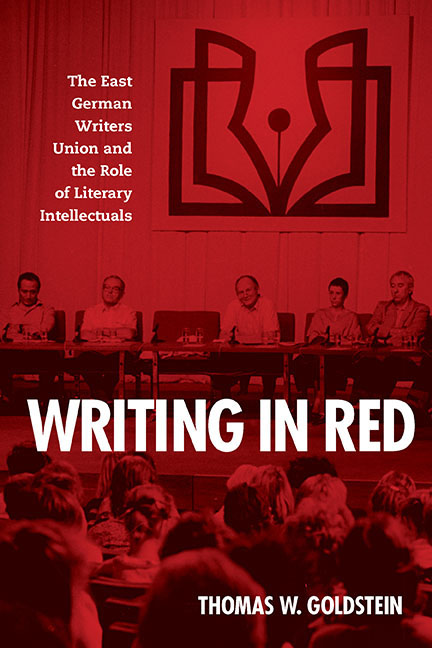Book contents
- Frontmatter
- Contents
- Acknowledgments
- List of Abbreviations
- Introduction
- 1 German Writers Associations through 1970
- 2 Socioeconomic Functions
- 3 The Era of No Taboos? 1971–76
- 4 A Disciplining Instrument, 1976–79
- 5 Defending Peace, Defining Participation, 1979–83
- 6 Years of Resignation, 1983–85
- 7 Glasnost in the GDR? 1985–89
- 8 Coming Full Circle, 1989–90
- Conclusion
- Notes
- Bibliography
- Index
- Frontmatter
- Contents
- Acknowledgments
- List of Abbreviations
- Introduction
- 1 German Writers Associations through 1970
- 2 Socioeconomic Functions
- 3 The Era of No Taboos? 1971–76
- 4 A Disciplining Instrument, 1976–79
- 5 Defending Peace, Defining Participation, 1979–83
- 6 Years of Resignation, 1983–85
- 7 Glasnost in the GDR? 1985–89
- 8 Coming Full Circle, 1989–90
- Conclusion
- Notes
- Bibliography
- Index
Summary
REAPPRAISALS OF THE WRITERS UNION began as soon as it had dissolved. Many arrived during the first phase of the Literaturstreit (literature dispute), a controversy sparked by Christa Wolf that quickly became a debate over whether or not East German culture had possessed any value beyond propaganda. In the summer of 1990, Wolf published “Was bleibt” (What Remains), written in 1979 but withheld because of its content. It recounts a day in the life of a prominent author (a stand-in for Wolf) who is dealing with the mental anguish caused by living in a police state. It was written during Wolf's deepest disillusionment during the Biermann affair; under constant Stasi observation in real life, she describes the distressing impact of surveillance. When finally published, the book generated fierce criticism. Many critics, especially West Germans, savaged Wolf for her “self-centered” concerns, the privileges she enjoyed, and the role her books played in obscuring the realities of the dictatorship. To them, it smacked of hypocrisy. As Ulrich Greiner incredulously asked in Die Zeit, “The state poet of the GDR was supposedly spied upon by the state security service of the GDR? Christa Wolf, the National Prize winner, the most prominent author of her country, SED member until the last moment, a victim of the Stasi?”
In this heated context, East German writers offered their views on the SV. Renate Feyl observed that after the Berlin Wall, it had functioned as an ersatz public sphere, “a small form of publicity behind closed doors,” but by the 1970s it was “more and more of a travel agency” for literary bigwigs. Richard Pietraß remembered the opportunities it had provided for writers to interact with colleagues, commenting: “If we were able to do anything in the union, I guess we got some promising things started. Unfortunately, it just as often came to blows.” Helga Schubert judged that its two biggest benefits were a tax ID number designating her as a freelance author and the ability to travel to the West, privileges that she assessed were a way for the state to influence writers. Feyl mentioned critical discussions, and Pietraß acknowledged the start they had made in achieving change, but to these authors the lasting memories were privilege and disappointment.
- Type
- Chapter
- Information
- Writing in RedThe East German Writers Union and the Role of Literary Intellectuals, pp. 217 - 230Publisher: Boydell & BrewerPrint publication year: 2017

